OpenSea, widely recognized as one of the foremost marketplaces for non-fungible tokens (NFTs), finds itself at a crossroads as the sector transitions from its explosive growth phase to a more cautious landscape. The vibrant interest that characterized the marketplace just two years ago has noticeably waned, leading to a sharp decline in user engagement and activity. This shift raises significant questions regarding the future of OpenSea and its potential viability in a rapidly evolving digital economy.
One glaring indication of OpenSea’s declining fortunes is the recent exodus of key executives. Over the past quarter, the market has witnessed the resignation of several top-tier leaders, including the former Chief Operating Officer, Shiva Rajaraman, and other senior executives such as Jeremy Fine and Karen Kreuzkamp. Their departures suggest a troubling atmosphere within the firm, possibly exacerbated by the prevailing market conditions. When high-level talent vacates an organization, it often signals deeper operational or strategic issues. Rajaraman’s new role at Uber, along with his colleagues’ transitions to notable firms like OpenAI and Scale AI, represents not just an individual setback for OpenSea but a potential loss of institutional knowledge.
The NFT market, initially buoyed by the surge in digital art and collectibles, is now replete with competitors challenging OpenSea’s once-dominant position. New platforms such as Blur and Magic Eden have emerged, capitalizing on the downturn by offering lower transaction fees and enhanced features, appealing to both creators and collectors. As these platforms gain traction, OpenSea must navigate the complexities of re-establishing its market leadership. The competition is fiercer than ever, forcing OpenSea to innovate or risk being left behind in this dynamic and rapidly changing environment.
In addition to the internal challenges and fierce competition, OpenSea is also grappling with external pressures from regulatory bodies. The firm is currently under investigation by the United States Securities and Exchange Commission (SEC) regarding the classification of NFTs on its platform and whether they may be deemed unregistered securities. This scrutiny adds another layer of uncertainty to OpenSea’s operations, potentially complicating its business model and driving away creators and investors who are wary of compliance issues.
The confluence of executive departures, heightened competition, and looming regulatory challenges places OpenSea at a critical juncture. While the NFT marketplace played a pivotal role in the digital revolution of 2021, its current decline prompts a re-evaluation of strategies and operational methods. To regain its stature and ensure long-term sustainability, OpenSea must adopt a proactive approach to address these multifaceted challenges. The ability to adapt and innovate in response to both market pressures and internal dynamics will be the determining factors in whether OpenSea can reclaim its position in a marketplace that is as volatile as it is promising.








